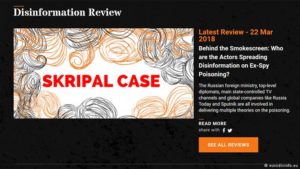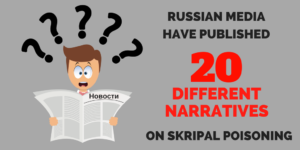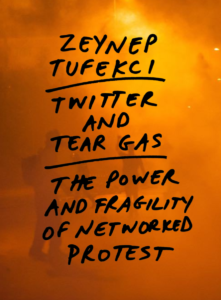 Having squandered solidarity in the Skripal case, the EU is fighting Russian propaganda at the same time as its experts fight among themselves about how, Deutsche Welle reports:
Having squandered solidarity in the Skripal case, the EU is fighting Russian propaganda at the same time as its experts fight among themselves about how, Deutsche Welle reports:
Jakub Janda, head of the Kremlin Watch program at the European Values Think Tank in Prague, is livid about the situation. …..Janda* has launched a campaign to not just save but supplement the unit, which has suffered from a lack of institutional enthusiasm as well as an aversion to controversy in the European External Action Service (EEAS) to which East Statcom belongs. In addition, member states have not wanted to fund it, preferring to run such programs nationally.
“I am surprised by how several individuals have decided to try to kill the best government initiative in Europe for exposing pro-Kremlin disinformation,” Janda said. “The Kremlin has some useful idiots who often serve its foreign policy goals. This helps sabotage various countermeasures and paralyze some of the right responses.”
 After the European Union’s high-level expert group on fake news presented its report to the press in early March, El Pais reported that Brussels won’t undertake specific legislative action against fake news, FakEU adds. On the contrary, the experts suggested that co- and self-regulation with — and by — the media sector are more effective tools to fight the spread of misinformation (Euractiv). Similar views were outlined in a different context by London Mayor Sadiq Khan as he spoke to a crowd at a South by Southwest (SXSW) conference.
After the European Union’s high-level expert group on fake news presented its report to the press in early March, El Pais reported that Brussels won’t undertake specific legislative action against fake news, FakEU adds. On the contrary, the experts suggested that co- and self-regulation with — and by — the media sector are more effective tools to fight the spread of misinformation (Euractiv). Similar views were outlined in a different context by London Mayor Sadiq Khan as he spoke to a crowd at a South by Southwest (SXSW) conference.
 The Baltic and Nordic states are ahead of the game in responding to Russia’s new generation warfare through a whole-of-society approach, notes POLITICO’s Reid Standish.
The Baltic and Nordic states are ahead of the game in responding to Russia’s new generation warfare through a whole-of-society approach, notes POLITICO’s Reid Standish.
“Beyond conventional military strategy, officials have increasingly moved to shore up their defenses against a wide array of new threats,” he writes, “from protecting against cyberattacks to guarding against election meddling, to educating their populations to be less susceptible to propaganda and fake news.”
Artificial intelligence (AI) tools will enhance autonomous agents’ influence, drawing on new insights from cognitive psychology, according to the State Department’s Matt Chessen. “Truth is not incentivized properly online. … Social media makes disinformation easy to disseminate,” he told  an April 7 Princeton Forum on Defending Democracy: Civil and Military Responses to Weaponized Information:
an April 7 Princeton Forum on Defending Democracy: Civil and Military Responses to Weaponized Information:
Laura Rosenberger, director of the Alliance for Securing Democracy, endorsed a public information campaign aimed at “the new stranger danger” online. … Rand Waltzman, a senior information specialist at the RAND Corporation, suggested creating a new, competing international social media platform that is independent, transparent and open to inspection ….YouTube has an economic incentive to show more ads by keeping people on their platform for a longer  period of time, said Zeynep Tufekci, an associate professor at University of North Carolina-Chapel Hill [and author of Twitter and Tear Gas: The Power and Fragility of Networked Protest]. After people see the video they came looking for, such as a Trump rally, she said they are often guided to another video with a more extreme viewpoint, like a white supremacist rally
period of time, said Zeynep Tufekci, an associate professor at University of North Carolina-Chapel Hill [and author of Twitter and Tear Gas: The Power and Fragility of Networked Protest]. After people see the video they came looking for, such as a Trump rally, she said they are often guided to another video with a more extreme viewpoint, like a white supremacist rally
“The algorithm is feeding a certain kind of bias into peoples’ information stream,” Tufekci said.
No doubt, the ease with which malevolent propaganda spreads and sticks can be alarming, notes the Financial Times, which warns of the dangers of a global ‘fake news’ backlash (HT: National Endowment for Democracy’s CIMA):
Mark Twain, the US author, put it powerfully when he said “a lie can travel halfway around the world while the truth is putting on its shoes”. That was more than a century before the internet and social media enabled disinformation to travel freely across borders at speeds unimaginable when Huckleberry Finn was floating along the Mississippi.
 *The Kremlin’s disinformation is outperforming the truth both in the virtual and in the physical space, Janda writes for the Atlantic Council, outlining five imperatives for countering Putin:
*The Kremlin’s disinformation is outperforming the truth both in the virtual and in the physical space, Janda writes for the Atlantic Council, outlining five imperatives for countering Putin:
- Every Western parliament should start a investigative committee to map hostile foreign influence activities within its borders
- Nord Stream 2 enables pure Russian political blackmail and must be stopped
- Influence linkages in the lobbying for Nord Stream 2 must be thoroughly investigated
- EEAS East STRATCOM Task Force exposing disinformation must be strengthened
- Every European country should adopt its own version of the Magnitsky Act







